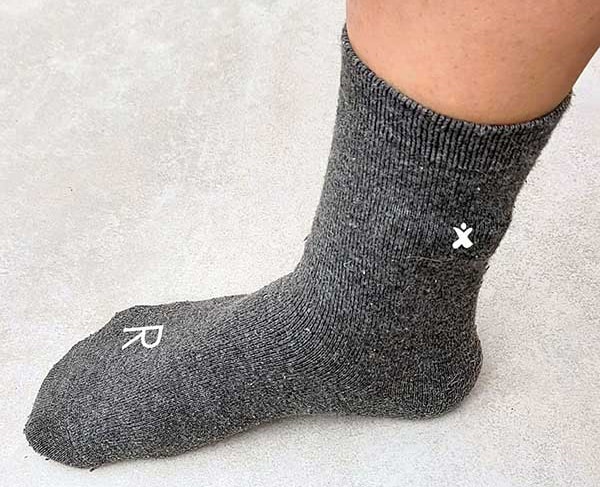Non-stigmatising smart socks could be used to improve wellbeing of people with dementia

‘Smart socks’ that aim to reduce stigma by looking like an everyday item of clothing and track rising distress in the wearer could improve the wellbeing of millions of people with dementia, non-verbal autism and other conditions that affect communication.
These innovative smart socks track heart rate, sweat levels and motion to give insights on the wearer’s wellbeing. Current alternatives to Milbotix’s product are worn on wrist straps, which are indiscrete, can sometimes have negative associations and could cause more stress, according to the inventor.
The socks look and feel like normal socks, do not need charging, are machine washable and provide a steady stream of data to carers, who can easily see their patient’s metrics on an app.
People who spend time in their own room in a care home are often not visible to care staff who may not be able to pick up on heightened distress or agitation until it becomes verbalised and wellbeing has significantly decreased. Using the smart socks, care staff can provide psychological or physical assistance at an earlier stage than they may otherwise be able to.
Inventor Dr Zeke Steer quit his job and took a PhD at Bristol Robotics Laboratory so he could find a way to help people like his great-grandmother, Kath, who became anxious and aggressive over time because of her dementia.
Dr Steer said: “The foot is actually a great place to collect data about stress, and socks are a familiar piece of clothing that people wear every day. Our research shows that the socks can accurately recognise signs of stress – which could really help not just those with dementia and autism, but their carers too.”
He studied for a PhD at Bristol Robotics Laboratory, which is jointly run by the University of Bristol and UWE Bristol. During the research, he volunteered at a dementia care home operated by the St Monica Trust.
Garden House Care Home Manager, Fran Ashby said: “Zeke’s passion was clear from his first day with us and he worked closely with staff, relatives and residents to better understand the effects and treatment of dementia.
“We were really impressed at the potential of his assisted technology to predict impending agitation and help alert staff to intervene before it can escalate into distressed behaviours. Using modern assistive technology examples like smart socks can help enable people living with dementia to retain their dignity and have better quality outcomes for their day-to-day life.”
While volunteering Dr Steer hit upon the idea of Milbotix, which he launched as a business in February 2020. The firm is now looking to work with innovative social care organisations to refine and evaluate the smart socks.
The assistive socks are currently being tested with people with mid- to late-stage dementia and the technology is being developed before the product is brought to market next year.
Milbotix will be supported by Alzheimer’s Society through its Accelerator Programme, which is helping fund the smart socks’ development, providing innovation support and helping test the product.
Natasha Howard-Murray, Senior Innovator at Alzheimer’s Society, added: “Some people with dementia may present behaviours such as aggression, irritability and resistance to care. This innovative wearable tech is a fantastic, accessible way for staff to better monitor residents’ distress and agitation.”

